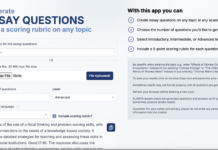
Today I have received a tip from a close colleague that Stanford University is planning to build a partnership with Alphabet Inc., the owner of Google, to enable Stanford to become a fully online global university by 2025.
Because the university is on an Easter break, it was difficult to find anyone at Stanford to verify this rumour, but the planning seems to be quite advanced. Apparently a highly confidential strategic planning committee has been working for some time on a plan to convert all programs at Stanford into a fully online format, using advanced technologies such as Artificial Intelligence (AI), Virtual and Augmented Reality (VR and AR), and data analytics (DA), technologies in which both Stanford and Google are world leaders.
This will enable Stanford to offer fully accredited degrees to many thousands of students worldwide at a fraction of the current tuition fees, which are currently just under $50,000 a year. Once fully online, the low tuition fees, estimated be around $1,000 a year, will be made possible by a highly innovative business plan being worked out jointly by Stanford and Google. Stanford plans to sell that part of the campus that will no longer be needed for teaching purposes. The Farm, as it is affectionately known, is over 8,000 acres, located close to Silicon Valley. With real estate currently selling at approximately $65 million an acre in Stanford, just selling off half the land will provide sufficient capital for the investment needed to convert all programs into an online mode, leaving the other half of the land for research and administrative purposes. The partnership with Google will allow Google to use data analytics from student online activity for commercial purposes, which will more or less cover the operational costs of online delivery.
I did manage to get hold of a couple of the committee, who asked not to be named as they are not authorised to give information on this project. However, both were very excited. ‘We won’t have to sack any of the current professorial staff, as we still need their subject expertise’, said one. The other said he was really looking forward to developing the first fully augmented reality engineering degree. ‘This could have huge implications,’ he said. ‘Imagine designing a whole bridge without actually having to physically test it! It’s only ever been tried once before without VR and it didn’t work.’ The Director of Stanford University’s Division of Continuing Studies said, ‘You know, it’s not such a big deal. We’ve been delivering online courses in our division for nearly 20 years, so we do know what we’re doing.’
Others outside the university I talked to though were not quite so sanguine. A spokesperson from WCET was concerned about how the accreditation or professional bodies would react. ‘It’s one thing for the university to give degrees; it’s quite another to get recognized by the Accreditation Boards for Engineering and Technology, who in the past have not accepted any online qualifications. But, hey, it’s Stanford, so who knows?’
My personal view is that it still has to get through Stanford’s Senate and Board of Governors. This will be the real test. However, if it is successful, this model will be totally disruptive of the rest of post-secondary education worldwide. If Stanford can scale its model, it could be not just a global university, but THE one university for the whole world. How cool would that be?
In the meantime, enjoy April the first.










 Dr. Tony Bates is the author of eleven books in the field of online learning and distance education. He has provided consulting services specializing in training in the planning and management of online learning and distance education, working with over 40 organizations in 25 countries. Tony is a Research Associate with Contact North | Contact Nord, Ontario’s Distance Education & Training Network.
Dr. Tony Bates is the author of eleven books in the field of online learning and distance education. He has provided consulting services specializing in training in the planning and management of online learning and distance education, working with over 40 organizations in 25 countries. Tony is a Research Associate with Contact North | Contact Nord, Ontario’s Distance Education & Training Network.


For those of you who are unaware of the tradition, April Fool’s Day is an annual celebration in some European and Western countries commemorated on April 1 by playing practical jokes and spreading hoaxes. The jokes and their victims are called April fools. People playing April Fool jokes often expose their prank by shouting “April fool” at the unfortunate victim(s). Some newspapers, magazines and other published media report fake stories, which are usually explained the next day or below the news section in smaller letters.
For a second though it is wonderful to imagine a world renowned university being fully online.
Online courses used to be popular till a couple of years ago. The cost effectiveness of such a course for many underprivileged students would be a much needed boost in the academic sector.
Oh, thought it was a dream come true. Well, I can’t stand physical university, physical classes, lost time, transport, silly talking, etc. Thought Coursera would give official titles. I am a true learner and critical thinker, so I don’t see much difference between online, book learning and physical presence excepting the physical cost of being there. I think Books and online learning are the best, but credits, recognition and titles are a problem. Would be good for those of us who learn for the love of it, for the love of solving problems and integrating knowledge.